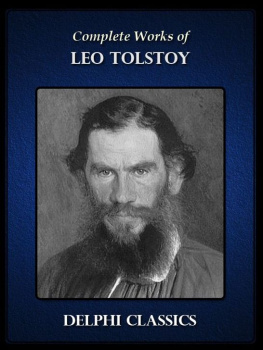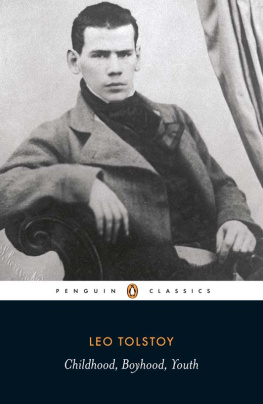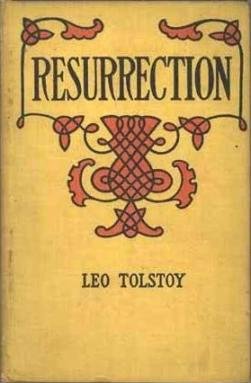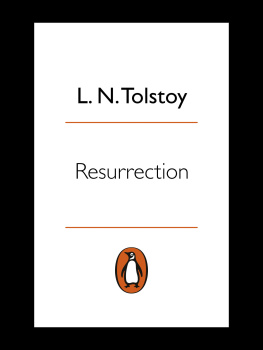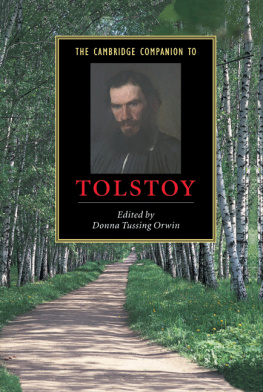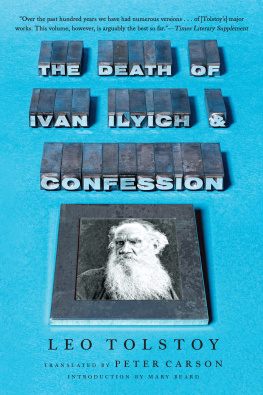LEO
TOLSTOY
COLLECTED
SHORTER
FICTION
(in two volumes)

Written over a period of more than half a century, these stories reflect every aspect of Tolstoys art and personality. They cover his experiences as a soldier in the Caucasus, his married life, his passionate interest in the peasantry, his cult of truth and simplicity, and, above all, his growing preoccupation with religion. Ranging in scope from novellas like The Kreutzer Sonata and Hadji Murad to folk-tales only a few pages long, they provide a marvelous opportunity to become closely acquainted with Russias great novelist. Aylmer and Louise Maudes classic translations are supplemented by new translations by Nigel J. Cooper of six stories, including two that have never before appeared in English.
ABOUT THE TRANSLATORS
LOUISE AND AYLMER MAUDE spent much of their lives in Russia. Their Quaker background led them to share many of Tolstoys views on spiritual life, moral obligation and passive resistance to violence, and they helped him to organize the Doukhobor migration to Canada in 1893. Aylmer Maude, whose business activities left him time to write a biography of his friend, also translated most of Tolstoys major works in partnership with his wife. These translations, which were commended by the author himself, are still widely regarded as the best.
NIGEL J. COOPER read French and Russian at Christ Church, Oxford. He has recently retired from Middlesex University where he was a Principal Lecturer in Modern Languages.
ABOUT THE INTRODUCER
J OHN BAYLEY is former Thomas Warton Professor of English Literature at the University of Oxford. His many books include Tolstoy and the Novel; Pushkin: A Comparative Commentary; The Short Story: Henry James to Elizabeth Bowen; An Essay on Hardy, Shakespeare and Tragedy and a detailed study of A. E. Housmans poems. He has also written several novels.
T HEN came Peter, and said to him, Lord, how oft shall my brother sin against me, and I forgive him? until seven times? Jesus saith unto him, I say not unto thee, Until seven times; but, Until seventy times seven. Therefore is the kingdom of heaven likened unto a certain king, which would make a reckoning with his servants. And when he had begun to reckon, one was brought unto him, which owed him ten thousand talents. But forasmuch as he had not wherewith to pay, his lord commanded him to be sold, and his wife, and children, and all that he had, and payment to be made. The servant therefore fell down and worshipped him, saying, Lord, have patience with me, and I will pay thee all. And the lord of that servant, being moved with compassion, released him, and forgave him the debt. But that servant went out, and found one of his fellow-servants, which owed him a hundred pence; and he laid hold on him, and took him by the throat, saying, Pay what thou owest. So his fellow-servant fell down and besought him, saying, Have patience with me, and I will pay thee. And he would not: but went and cast him into prison, till he should pay that which was due. So when his fellow-servants saw what was done, they were exceeding sorry, and came and told unto their lord all that was done. Then his lord called him unto him, and saith to him, Thou wicked servant, I forgave thee all that debt, because thou besoughtest me: shouldest not thou also have had mercy on thy fellow-servant, even as I had mercy on thee? And his lord was wroth, and delivered him to the tormentors, till he should pay all that was due. So shall also my heavenly Father do unto you, if ye forgive not every one his brother from your hearts. Matt. xviii. 2135.
T HERE once lived in a village a peasant named Ivn Stcherbakf. He was comfortably off, in the prime of life, the best worker in the village, and had three sons all able to work. The eldest was married, the second about to marry, and the third was a big lad who could mind the horses and was already beginning to plough. Ivns wife was an able and thrifty woman, and they were fortunate in having a quiet, hardworking daughter-in-law. There was nothing to prevent Ivn and his family from living happily. They had only one idle mouth to feed; that was Ivns old father, who suffered from asthma and had been lying ill on the top of the brick oven for seven years. Ivn had all he needed: three horses and a colt, a cow with a calf, and fifteen sheep. The women made all the clothing for the family, besides helping in the fields, and the men tilled the land. They always had grain enough of their own to last over beyond the next harvest, and sold enough oats to pay the taxes and meet their other needs. So Ivn and his children might have lived quite comfortably had it not been for a feud between him and his next-door neighbour, Limping Gabriel, the son of Gordy Ivnof.
As long as old Gordy was alive and Ivns father was still able to manage the household, the peasants lived as neighbours should. If the women of either house happened to want a sieve or a tub, or the men required a sack, or if a cart-wheel got broken and could not be mended at once, they used to send to the other house, and helped each other in neighbourly fashion. When a calf strayed into the neighbours threshing-ground they would just drive it out, and only say, Dont let it get in again; our grain is lying there. And such things as locking up the barns and outhouses, hiding things from one another, or backbiting were never thought of in those days.
That was in the fathers time. When the sons came to be at the head of the families, everything changed.
It all began about a trifle.
Ivns daughter-in-law had a hen that began laying rather early in the season, and she started collecting its eggs for Easter. Every day she went to the cart-shed, and found an egg in the cart; but one day the hen, probably frightened by the children, flew across the fence into the neighbours yard and laid its egg there. The woman heard the cackling, but said to herself: I have no time now; I must tidy up for Sunday. Ill fetch the egg later on. In the evening she went to the cart, but found no egg there. She went and asked her mother-in-law and brother-in-law whether they had taken the egg. No, they had not; but her youngest brother-in-law, Tars, said: Your Biddy laid its egg in the neighbours yard. It was there she was cackling, and she flew back across the fence from there.
The woman went and looked at the hen. There she was on the perch with the other birds, her eyes just closing ready to go to sleep. The woman wished she could have asked the hen and got an answer from her.
Then she went to the neighbours, and Gabriels mother came out to meet her.
What do you want, young woman?
Why, Granny, you see, my hen flew across this morning. Did she not lay an egg here?
We never saw anything of it. The Lord be thanked, our own hens started laying long ago. We collect our own eggs and have no need of other peoples! And we dont go looking for eggs in other peoples yards, lass!
The young woman was offended, and said more than she should have done. Her neighbour answered back with interest, and the women began abusing each other. Ivns wife, who had been to fetch water, happening to pass just then, joined in too. Gabriels wife rushed out, and began reproaching the young woman with things that had really happened and with other things that never had happened at all. Then a general uproar commenced, all shouting at once, trying to get out two words at a time, and not choice words either.
Youre this! and Youre that! Youre a thief! and Youre a slut! and Youre starving your old father-in-law to death! and Youre a good-for-nothing! and so on.




